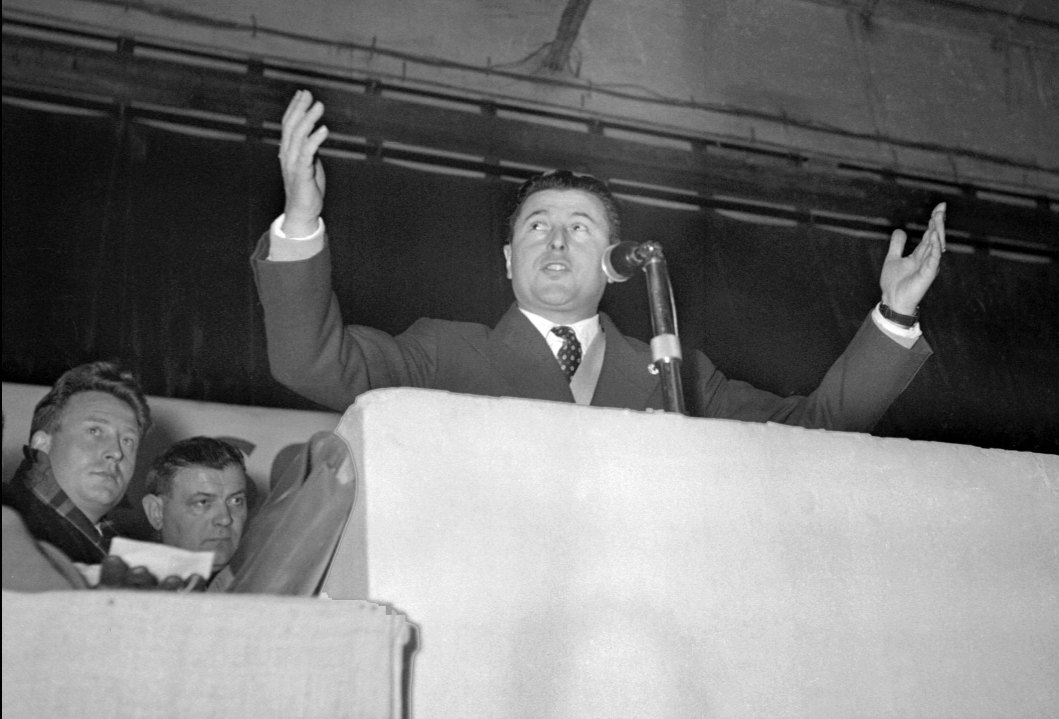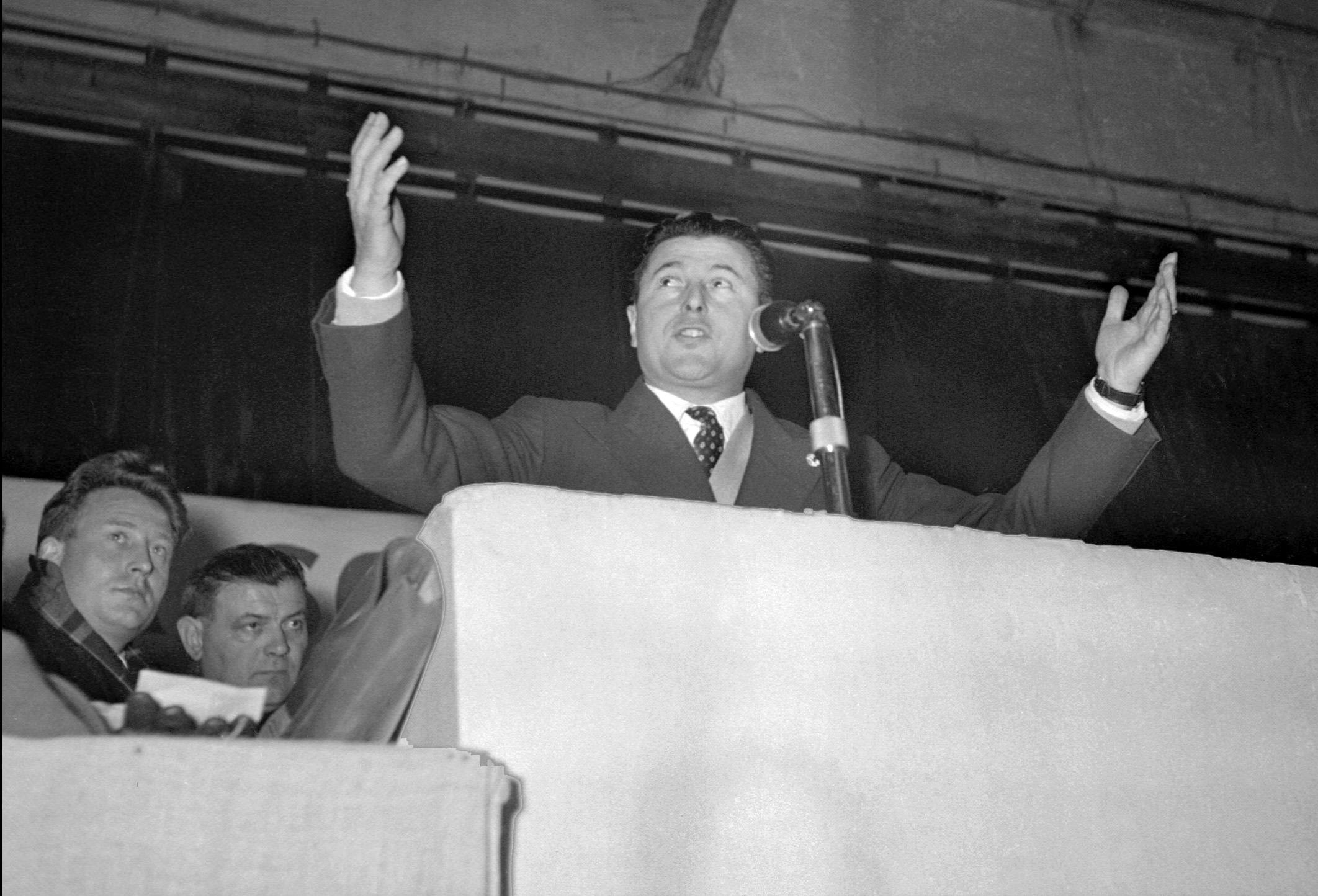Parliament is a “brothel”. The state is an enterprise of “thieves” engaged in a conspiracy against “the good little people” and the “humble housewife”. Time, then, for a party that will stand up for “the little man, the downtrodden, the trashed, the ripped off, the humiliated”.
Not, as you might suspect, the most recent UKIP manifesto but, rather, the sentiments expressed by Pierre Poujade during the run-in to the 1954 elections to the French National Assembly. Poujade’s party, the Union to Defend Shopkeepers and Artisans, shocked France’s political elite by winning 2.5 million votes and sending 55 deputies to Paris.
Charles de Gaulle sniffed that “In my day, grocers voted for solicitors; now solicitors vote for grocers”, a sentiment with which David Cameron might this week have some sympathy. Nevertheless, as the General (then in self-imposed exile at Colombey) admitted, Poujade’s success was “simply one of the signs of endemic revolt generated by the… incapacity of the regime”. The Fourth Republic endured a series of feeble governments; the time was ripe for a populist revolt.
Poujade’s party proved short-lived (though it is also, in some respects, the spiritual ancestor of today’s Front National) but Poujadism remains part of the political lexicon. Poujade’s populism was anti-tax, anti-big business, anti-intellectual, proudly provincial and overwhelmingly suspicious of elites of any kind.
Again, the parallels with UKIP are striking. Poujade even made sure he was photographed drinking wine, in contrast to the milk-swilling Prime Minister Pierre Mendes-France.
UKIP pose Labour and the Conservatives – but especially the latter – a problem that is not liable to be solved by policy manoeuvres. There is nothing the Tory leadership can do that will outflank UKIP on europe (or immigration). Not without splitting the Conservative party, at any rate. Worse still, the more the party panders to UKIP voters the more it loses sight of the fact that, even now, there remain many more voters in the muddled, middle-ground of British (and especially English) politics than there are on the extreme of either flank.
UKIP’s appeal lies less in policy – Farage is quite happy to admit that a good deal of the party’s platform was written on the back of a fag-packet – than in sentiment. It is a sympathy or, if you prefer, a persuasion. A mentality, not a programme for government. A cry of disgruntled pessimism, not a series of solutions. Accordingly, it can’t be pacified by policy shifts. It is a question of style not of substance. Like Boris Johnson, Farage is an entertainer. This ensures he is judged by different standards.
Which is bad news for David Cameron. The Prime Minister cannot possibly moderate his style to appeal to UKIP voters. They – and in their number we may include a good proportion of UKIP-sympathising Tory backbenchers – already suspect he views them with contempt and they are probably not wrong to think that. Indeed, the more UKIP are vilified the happier they are. Theirs is a politics of the laager or the last redoubt and telling them how foolish they are merely earns the response So what? And who are you anyway?
I fancy UKIP voters suspect Cameron is a privileged but empty suit. They are not wholly wrong about this either. It is certainly easy to rail against a government stuffed with politicians from comfortable backgrounds. If Cameron were a stronger (or at least a more positively defined) leader this might not matter. Nor would it be a problem if the economy were in finer shape. Instead, living standards are being squeezed and there is a sense that even though the government is not hopelessly indifferent to the problems of the lower middle-classes it has no real idea how to assist them.
In such conditions the surprise may be that it took UKIP so long to win even a few dozen council seats in the English shires. For all the government’s good intentions few people would claim that it has enjoyed firm leadership. And in the end a good part of the electorate, however disgruntled they may be, will put up with policies they do not favour if these are at least pursued with vigour by a government strong enough to give the impression it knows what it believes and believes how it can put those beliefs into practice.
Is David Cameron the man to lead that kind of government? Not at the moment he ain’t. Is David Cameron “on your side”? Does he “care about people like you?” Up to a point. Cameron lacks the vocabulary – perhaps, even, the bottom – to talk to “our kind of people”. Or at least it seems as if this is the case.
UKIP are flavour of the month. They will do well at the next european parliament elections too. But publicity and its attendant scrutiny will be the death of them. Nigel Farage may entertain television producers but there comes a point at which the joke begins to wear thin. A protest vote for a political entertainer is fine for council (or european) elections but not quite so appealing at a general election. You might enjoy a night out with Farage but you wouldn’t trust him to drive you home.
Even so UKIP will remain an irritant but, as I say, something like this has been brewing for a while. 2010’s brief bout of Cleggmania was another demonstration of the way in which politics now operates rather as the stock-market did at the height of the dot-com boom. “Traditional” stocks – that is, political parties – are boring and under-valued; the thirst for the next new thing ensures that said fresh face is immediately over-valued. Everyone, at some level, “knows” this but worries that, just perhaps, they might miss the new thing that really is the next big thing. And so everyone piles in, just to be on the safe side. For now.
And yet even if under-valued, the traditional political parties are still in trouble. This is hardly a British phenomenon. From Ireland to Israel via Italy we have seen the rise of political outsiders who earn some measure of trust – at least for a while – precisely because they are not tainted by any association with the established political system. The brief flickering of the Tea Party in the United States was another example testifying to the frustrations of politics-as-usual and the Republican party’s multiple failures.
Nearly five years on from the financial crash, mainstream parties – of either left or right, though those labels matter less these days – are still looking for answers. Like Iain Martin, I’m surprised Theodore Roosevelt is not mentioned more often these days.
It is astonishing, really, that the financial (and political) elites have not suffered more. Torch and Pitchfork Inc have not prospered quite as much as you might have expected. Doubtless that reflects an appreciation that even political outsiders don’t have the answers either but I suspect it also reveals a certain depressed fatalism that is both disconcerting and problematic for the longer-term health of democratic politics.








Comments